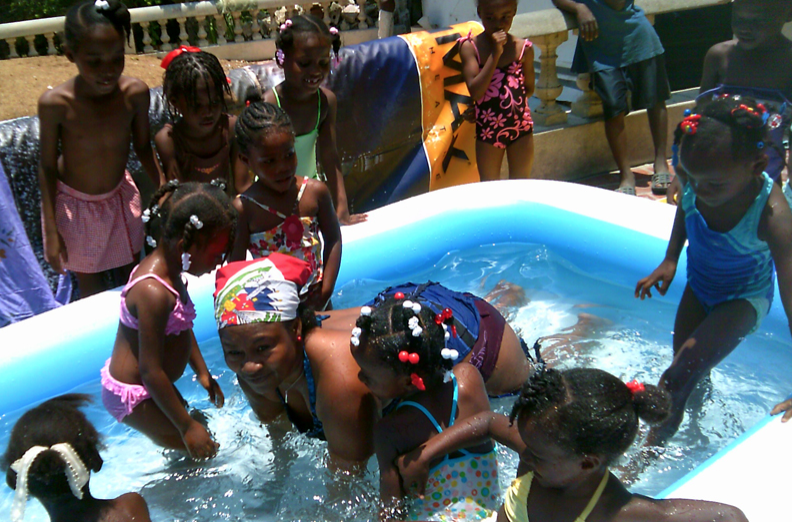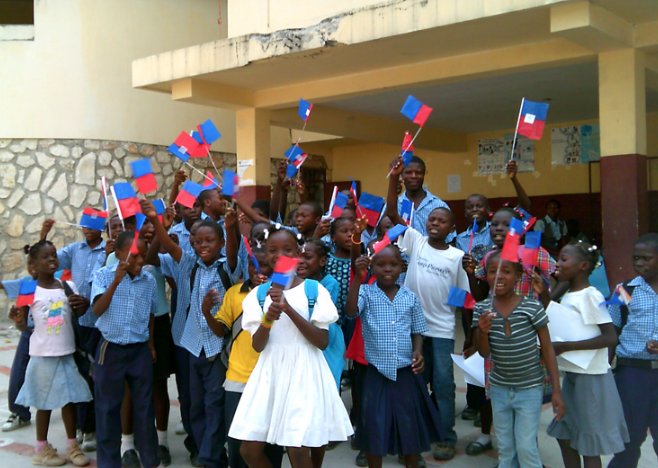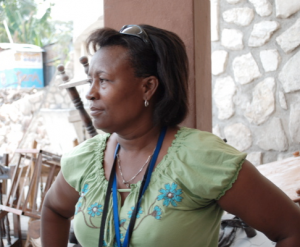By: Ryan Sawatzky
Originally Posted: June 2011
SOPUDEP Founder and Director Réa Dol sent me these pictures a couple day ago of the Haitian Flag Day celebration she put together for the little ones at the school. I just had to post them! I also thought this would be a fitting theme as some of us prepare for our annual rituals of summer fun.
On the surface, this romp in the inflatable pools just looks like a normal fun activity for these kids, not unlike what we’ve seen in a thousand suburban backyards during the summer months. However, for these children of Haiti’s poor majority, there are much bigger social ramifications going on here. In Haiti, only 20% of the population has access to clean drinking water and therefor a swimming pool is a luxury that exclusively belongs to the rich. There are no public swimming pools in the country which further solidifies the pool itself a symbol of the elite.
This is for Rea and her staff a chance to further break social barriers that divide rich and poor. For the kids, a day of fun in the sun they will not soon forget!
When I saw these pictures i immediately though of a chapter on this very subject from “The Eyes Of The Heart”, a book written by ex Haitian President Jean-Bertrand Aristide during his second term as president in 2000. I’ll leave you with some select passages from this chapter that explains the significance of the swimming pool in Haiti.
“On weekends it is the kids from Lafanmi Selavi (Aristide’s Foundation) who come to our house to spend time, to share food, talk, play and swim in the swimming pool. It is a small pool, too small for four hundred kids, but for them it is a piece of paradise. Sometimes we invite other children; restaveks, children from the parishes in Port-au-Prince; sometimes a Lafanmi Selavi bus goes to Cite Soleil, to La Saline, to Carrefour to pick up children who want to swim…
We know the kids need food, we know they need school, but we cannot give them these things in a day. So while we are working to change the society, we can give them a day in a swimming pool. We say no child is so poor she does not deserve to swim in a pool. and if you imagine this has no impact on the society, think again.
The kids swim with us, with their teachers, with a group of agronomists who work with them on Saturdays, and with American friends and volunteers working at Lafanmi Selavi. A mix of races and social classes in the same water. Sometimes these images have appeared on television. Shortly after we began this experience we started hearing reports from friends among the upper class of rumors that I was preparing these “vagabon”, these street children, to invade their swimming pools. Were it not tragic it would be comic. Perhaps the real root of the fear is this: If a maid in a wealthy home sees children from Cite Soleil swimming in a swimming pool on television, she may begin to ask why her child cannot swim in the pool of her boss…
The polorizations are many: literate/illiterate, rich/poor, black/white, male/female, those who have clean water to drink/those who don’t. In Haiti, where these polarities remain so strong, swimming in the same water has both psychological and social repercussions. You swim with people you are close to. If you are a family, if you are a community, swimming together may improve the quality of the relationship. Our experience has shown that the water can help to melt the barriers between us, and wash away the dirt of prejudice.”
Jean-Bertrand Aristide, from The Eyes of the Heart (written during his second term as Haiti’s President in 2000)


